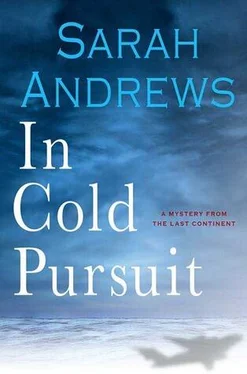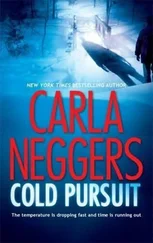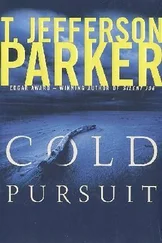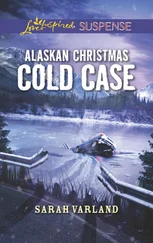An enlisted man moved to that door and popped it open. Instantaneously, all moisture on the aircraft shattered into ice as the warm, humid New Zealand air she had been breathing was sucked away into the emptiness of outside. It was as if some cold monster had put its lips to the doorway.
That’s exactly what did happen , Valena thought, her mind reaching out into the frozen white wilderness beyond to take in each and every sensation. But that monster is Antarctica!
She stabbed her arms into the sleeves of the giant red parka that had been issued to her in Christchurch. Instantly, she felt warmth returning to her as the dense surrounding of down cuddled back heat that it gathered from her own fragile flesh. The parka was heavy and bulky, like a wearable sleeping bag. It’s true , she realized. It really is this cold here. And this dry.
Falling into line behind the other passengers, she juggled her duffel bags and stumbled down the steps onto the ice. The ice! “See you on the ice,” her professor had told her, as he’d left Reno two weeks ahead of her. So this was what was meant by that salutation! She staggered around in a drunken pirouette in her loose, toasty warm clothing and voluminous boots, taking in the scene. The ice spread flat and cold and white for miles in every direction except to the north, where the island rose in steep volcanic cones from a chaotic fringe of ice pressure ridges. The thin civilization of McMurdo Station clung like a mass of barnacles to an amphitheater of naked black basalt between the nearest cones. She set down her duffels and reached into one of the array of patch pockets that encrusted the front of her parka, searching for her camera.
“Keep moving!” someone barked. “You can take your pictures later!”
Valena turned to face the man who had spoken so brusquely. Why was he in such a hurry? Like everyone else around her, he was covered from chin to mid-thigh in the blaze red of a huge, standard-issue expedition parka, and from there down by the black insulated wind pants. He had pulled a brightly colored fleece fool’s cap down tightly over his brow, its levity incongruous above his scowl. Staring past her into nothingness, he swung his arm briskly from the shoulder, exhorting her to hurry toward a looming red vehicle that had been cheerfully emblazoned in white letters as IVAN THE TERRA BUS.
Valena craned her neck. Ivan was huge. Its passenger compartment was not much bigger than that of a standard school bus, but it was mounted atop six balloon tires, each taller than Valena. The driver’s side door was accessed via a ladder that was bolted to the side, and on the passengers’ side—well, most large buses had steps, but this was a full staircase. Everything here was completely out of scale with anything she had seen before.
She picked up her duffels and shuffled toward the bus. Climbed the stairs. Found a seat. Looked around. The other passengers stared out the scratched windows, exhausted but wired. She gazed from face to face, trying to figure out which of these people were scientists like herself—here on grants from the National Science Foundation or NASA—and which were employees of Raytheon Polar Services, the contractor that provided all the infrastructure support that would soon put her out in a field camp on the ice, far beyond the jarring hustle and bustle of this arrival.
The scowling driver climbed aboard, closed the door, and put Ivan in gear. Off they went across the ice toward the island and its harsh jumble of steel buildings. At the edge of the ice, the road pitched steeply upward, then turned between the hash of metal buildings. Like the bus, some of the structures had names painted on them: Royal Society. Hotel California. Everything rolled past too quickly in a chaos of impressions, until the bus pulled up in front of a wooden building that looked like a Swiss chalet. It looked like part of a movie set, no more real than anything else she was seeing.
The driver opened the door and got out. The other passengers rose and headed down the aisle toward the stairs. She followed them, peering through the windows for her first glimpse of her wandering professor. Emmett Vanderzee had a way of getting lost sometimes, mostly in his head, but he was a brilliant man, and the work he was doing was essential. He and an assistant had come south a week ahead of her, “to look after a few details from last year,” he had told her.
But where was he? All the people gathered outside to greet the arrivals looked alike in their red parkas, like a gaggle of bad Santa Claus impersonators. Even so, Emmett should have been easy to pick out: he was tall and angular, and, even bundled in a big red parka, his pale narrow face and long curving nose and crooked smile would be visible, a combination of attributes that gave him the aspect of a curious camel. If he wasn’t wearing a hat she would spot his thin rooster-tail of unkempt, graying hair, and if he had forgotten his sunglasses, she would see his soft, inward-gazing blue eyes.
She looked from face to face. He wasn’t there. Perhaps he was waiting for her inside the chalet, where everyone from the bus was now heading, first stacking their orange duffel bags on the porch. She followed along, peering into every face she passed, growing anxious. He’d said that there would be a briefing that would go by way too fast for a “fingie”—whatever that was—but that he would be there , to help her put everything in context and so that they could get right to work preparing for their field deployment.
She pushed through the door into an airlock, passing a sign instructing all visitors to take off their crampons before entering, and continued through the inner door into a small assembly room that had been prepared with chairs, a screen, and a projector. Emmett wasn’t here, either.
The in-brief was an overwhelming flood of instructions presented by an array of National Science Foundation and Raytheon section chiefs in rapid monotones. To check out keys to your dorm room, go to building such-and-such and see so-and-so. To check out a vehicle, see this blah-de-blah in building mumbled number. Raytheon employees have training sessions here and science grantees will meet there. Don’t bug Raytheon personnel in the dining hall; make an appointment to see them in their offices. Wash your hands after using the bathroom and before meals so you don’t spread the crud. Put your sunglasses on even when passing between buildings; if the UV doesn’t get you, the blowing grit will. Don’t leave McMurdo before you’ve gone through Happy Camp. Don’t go anywhere without checking out. After hours, call the fire department for phone numbers. Fill out this form. And this one. And this one. Make sure you recycle. Do this, don’t do that. Don’t screw up. Don’t. Don’t. Don’t.
The United States, Reno, and the Desert Research Institute seemed long ago and far away, figments of another planet.
At last this firing-squad introduction to How to Survive in McMurdo was over and everybody was standing up. They had arrived too late for supper, so someone was handing out another round of sack lunches. Eating seemed a good idea, but what was she supposed to do after that? Where in hell was Emmett? Or, where in… the ice?
She heard her name being called: “Valena Walker? Is Valena Walker here?”
She turned. A tall, bearded man was moving toward her. “Ah, there you are,” he said, reading the name tag on her parka. “Would you come into my office, please?” He gestured toward an inner door. He wasn’t smiling.
Valena followed him, her big blue boots thumping on the floorboards. Something was wrong, that much was now certain. Her stomach felt like it was full of sand.
The man closed the door behind them. “Have a seat,” he said.
Читать дальше












